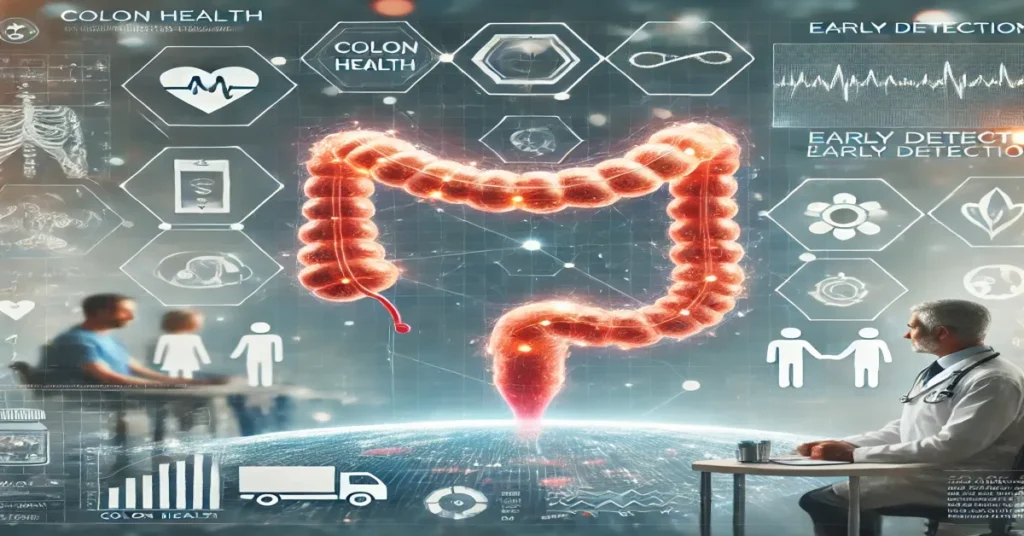In the fast-paced world of healthcare, new technologies and innovations are emerging to enhance the way we monitor and maintain our health. One such domain that has been receiving attention in recent times is PulseColon.com. Though it may sound like a website or service related to colon health and wellness, the exact purpose and offerings of PulseColon.com remain largely undefined. However, from its name, we can assume that this domain may be focused on delivering resources, tools, or services related to colon health, early detection of colorectal diseases, or innovative health monitoring technologies.
In this comprehensive article, we will delve into the importance of colon health, why early detection is critical in preventing colon-related diseases, the role of technology in healthcare monitoring, and what platforms like PulseColon.com could potentially offer in this space. We will also explore the broader context of colon health, including the challenges in detecting colorectal cancer and the rise of new tools to assist individuals in tracking their health.
The Importance of Colon Health
Colon health is an essential aspect of overall well-being, yet it is often overlooked by individuals who may not understand the potential risks of neglecting it. The colon, also known as the large intestine, plays a vital role in the digestive process, responsible for absorbing water, nutrients, and minerals from food while storing and eliminating waste. Maintaining a healthy colon is important for digestive efficiency, waste removal, and preventing various diseases, including colorectal cancer.
1. What is the Colon?
The colon is part of the gastrointestinal (GI) tract, and it connects the small intestine to the rectum. The colon is divided into four sections: the ascending colon, transverse colon, descending colon, and sigmoid colon. As food moves through the digestive system, the colon extracts water and salt from the digested material before passing waste (stool) to the rectum for elimination. Colon health is crucial for this process to occur efficiently and without complications.
2. Common Colon Health Issues
There are several common conditions associated with poor colon health, ranging from mild to severe. Some of the most prevalent colon health issues include:
- Constipation: A condition in which bowel movements become infrequent and stools are difficult to pass.
- Irritable Bowel Syndrome (IBS): A functional disorder that causes symptoms like cramping, bloating, and diarrhea or constipation.
- Diverticulitis: Occurs when small pouches (diverticula) that form in the colon become inflamed or infected.
- Inflammatory Bowel Disease (IBD): Includes conditions like Crohn’s disease and ulcerative colitis, both of which cause chronic inflammation of the colon.
- Colorectal Cancer: A potentially deadly form of cancer that develops in the colon or rectum and is often diagnosed through colonoscopy and other screenings.
Maintaining a healthy colon requires a balanced diet, regular exercise, adequate hydration, and, most importantly, routine screenings, especially for individuals over the age of 50.
Read: Google Classroom 6x: Transforming Education in the Digital Age
Early Detection of Colorectal Cancer
One of the most critical aspects of colon health is the early detection of colorectal cancer, a disease that remains one of the leading causes of cancer-related deaths globally. Detecting colorectal cancer in its early stages dramatically improves the chances of successful treatment and survival. Platforms like PulseColon.com could serve as valuable tools for raising awareness, providing educational resources, or even offering virtual screening tools to help individuals monitor their colon health.
1. Why Early Detection Matters
Colorectal cancer typically begins as small, benign polyps (non-cancerous growths) in the lining of the colon or rectum. Over time, these polyps can develop into cancerous tumors if left undetected and untreated. The key to preventing the progression of colorectal cancer is early detection, which allows doctors to remove precancerous polyps before they turn malignant.
According to the American Cancer Society (ACS), colorectal cancer is the third most common cancer diagnosed in both men and women in the United States. The ACS also emphasizes the importance of regular screening for individuals aged 45 and older, as early detection can reduce the risk of dying from colorectal cancer by as much as 68%.
2. Common Screening Methods
There are several methods for detecting colorectal cancer, each with its advantages and limitations. Some of the most common screening methods include:
- Colonoscopy: The most widely recommended screening test for colorectal cancer. A colonoscopy involves the insertion of a flexible tube with a camera into the rectum to examine the entire colon. During the procedure, doctors can remove polyps for biopsy.
- Fecal Immunochemical Test (FIT): A non-invasive test that checks for hidden blood in the stool, which may indicate colorectal cancer or polyps.
- Flexible Sigmoidoscopy: Similar to a colonoscopy but only examines the lower part of the colon and rectum.
- Stool DNA Test: A test that analyzes stool samples for abnormal DNA markers associated with cancerous or precancerous cells.
3. Emerging Technologies in Early Detection
Recent advancements in medical technology have introduced innovative tools for early detection, including:
- Artificial Intelligence (AI): AI-powered software is being developed to assist doctors in identifying polyps during colonoscopies, improving detection rates.
- Virtual Colonoscopy (CT Colonography): A non-invasive imaging technique that uses CT scans to create a 3D image of the colon, allowing doctors to detect abnormalities without the need for invasive procedures.
- Blood-Based Biomarker Tests: Ongoing research is focused on developing blood tests that can detect cancer-related biomarkers, making early detection more accessible and less invasive.
PulseColon.com could potentially integrate some of these cutting-edge technologies into its offerings, providing users with access to virtual consultations, AI-driven detection tools, or educational content on the latest advancements in colorectal cancer screening.
The Role of Technology in Colon Health Monitoring
The healthcare industry is undergoing a digital transformation, with technology playing a crucial role in improving patient outcomes, enhancing early detection, and making health monitoring more convenient. Websites and platforms like PulseColon.com can serve as a hub for colon health monitoring by offering users the tools they need to keep track of their digestive health.
1. Telemedicine and Virtual Health Platforms
Telemedicine has seen significant growth in recent years, particularly during the COVID-19 pandemic. Many individuals now turn to virtual health platforms for consultations, check-ups, and screenings. Telemedicine platforms offer several advantages:
- Convenience: Patients can connect with healthcare professionals from the comfort of their own homes, eliminating the need for travel.
- Accessibility: Individuals in rural or underserved areas can access healthcare services they might otherwise struggle to obtain.
- Cost-Effective: Virtual visits often cost less than in-person appointments, making healthcare more affordable.
PulseColon.com could leverage telemedicine technology to offer virtual consultations, provide recommendations for colon health screenings, and connect patients with specialists in colorectal health.
2. Wearable Health Devices
Wearable health devices, such as fitness trackers and smartwatches, have become increasingly popular tools for monitoring various aspects of health. While most wearables focus on tracking physical activity, heart rate, and sleep patterns, some emerging devices are designed to monitor digestive health.
For example, smart pills equipped with sensors can be ingested to provide real-time data on gastrointestinal activity, pH levels, and transit times. These devices can offer valuable insights into how the colon is functioning and whether any abnormalities are present.
Platforms like PulseColon.com could incorporate data from wearable health devices, enabling users to track their digestive health over time and receive personalized insights.
3. Health Apps for Colon Wellness
Health apps have revolutionized the way individuals manage their wellness. There are apps available that focus on specific areas of health, including colon wellness. Some apps allow users to log their bowel movements, track digestive symptoms, monitor dietary habits, and receive recommendations for improving gut health.
PulseColon.com could offer a dedicated app that provides users with daily tips on maintaining a healthy colon, sends reminders for upcoming colonoscopy appointments, and encourages users to complete at-home screening tests like the FIT or stool DNA test.
Read: ChillWithKira Ticket Show: The Ultimate Guide to a Captivating Experience
Dietary Recommendations for Colon Health
A healthy diet plays a significant role in maintaining colon health and reducing the risk of colon-related diseases. A platform like PulseColon.com could serve as a valuable resource for providing dietary guidelines, recipes, and meal plans aimed at supporting colon wellness.
1. Fiber-Rich Foods
Fiber is essential for promoting regular bowel movements and preventing constipation, which can strain the colon. Fiber also helps reduce the risk of developing polyps and colorectal cancer. Foods high in fiber include:
- Whole grains (e.g., oats, quinoa, barley)
- Fruits (e.g., apples, pears, berries)
- Vegetables (e.g., broccoli, spinach, sweet potatoes)
- Legumes (e.g., beans, lentils, chickpeas)
A diet rich in fiber ensures that waste moves smoothly through the digestive tract and helps maintain a healthy colon.
2. Probiotics and Prebiotics
Probiotics are beneficial bacteria that promote a healthy balance of gut flora, while prebiotics serve as food for these beneficial bacteria. Together, they help maintain a healthy digestive system and support colon function. Probiotic-rich foods include yogurt, kefir, and fermented vegetables like sauerkraut and kimchi. Prebiotic-rich foods include garlic, onions, bananas, and asparagus.
3. Limit Processed Foods and Red Meat
Research has shown that diets high in processed foods, red meat, and saturated fats may increase the risk of colorectal cancer. Processed meats, such as bacon, sausage, and deli meats, contain preservatives and additives that can negatively affect colon health. Reducing the consumption of these foods and opting for lean protein sources like fish and poultry can improve overall colon health.
4. Hydration
Proper hydration is key to maintaining a healthy digestive system. Drinking plenty of water helps soften stool, making it easier to pass and reducing the risk of constipation. Dehydration, on the other hand, can lead to harder stools, increasing the strain on the colon.
PulseColon.com could offer users personalized dietary recommendations based on their health goals, age, and family history of colon-related diseases. By providing recipes, meal plans, and tips for improving gut health, the platform could empower individuals to take control of their colon wellness.
PulseColon.com: Potential Features and Benefits
As we explore the potential of PulseColon.com, it’s important to consider the types of features that could make this platform a valuable resource for users concerned about their colon health. Whether it’s through educational content, health monitoring tools, or early detection technologies, PulseColon.com could play a significant role in promoting colon wellness.
1. Educational Resources
One of the primary benefits of PulseColon.com could be providing a wealth of educational content about colon health. This content might include:
- Articles and guides on how to maintain a healthy colon.
- Information on the importance of routine screenings and early detection of colorectal cancer.
- FAQs about common colon health conditions, such as IBS, IBD, and diverticulitis.
2. Health Monitoring Tools
PulseColon.com could offer users access to various health monitoring tools, such as symptom trackers, bowel movement logs, and dietary journals. These tools would allow users to gain insights into their digestive health and identify potential issues early on.
3. Virtual Consultations
As mentioned earlier, virtual consultations with healthcare professionals could be one of the key features of PulseColon.com. By offering virtual appointments, the platform could make it easier for individuals to seek advice on colon health, discuss screening options, and receive guidance on next steps.
4. AI-Driven Health Insights
The integration of AI technology could enhance the user experience by providing personalized health insights based on data from screening tests, wearable devices, and user-entered information. For example, AI algorithms could analyze stool samples submitted through at-home screening tests and provide a risk assessment for colorectal cancer.
5. Community Support
PulseColon.com could foster a sense of community by offering discussion forums, support groups, and live webinars hosted by healthcare experts. These features would give users a platform to ask questions, share their experiences, and learn from others facing similar health challenges.
The Future of Health Monitoring: What’s Next for Colon Wellness?
As technology continues to evolve, the future of health monitoring for colon wellness looks promising. Innovations in AI, wearable devices, and non-invasive screening methods are making it easier for individuals to take charge of their digestive health.
In the coming years, we can expect to see more personalized and accessible solutions for colon health monitoring, with platforms like PulseColon.com playing a key role in delivering these innovations to users. Whether it’s through real-time health insights, virtual colonoscopies, or AI-powered detection tools, the future of colon wellness is bright.
Conclusion: Why Colon Health Should Be a Priority
Maintaining colon health is essential for preventing digestive disorders and reducing the risk of colorectal cancer. Early detection through routine screenings, combined with healthy lifestyle choices, can help individuals take control of their colon health.
While PulseColon.com may still be in its early stages or yet to be fully realized, the potential for platforms like it to transform how we monitor colon health is clear. By offering educational resources, health monitoring tools, and access to healthcare professionals, PulseColon.com could serve as a valuable ally in the fight against colorectal cancer and other colon-related conditions.
In a world where health monitoring is becoming more digitized and accessible, the future of colon wellness lies in platforms that empower individuals to stay informed, seek early detection, and prioritize their long-term health.
4o







